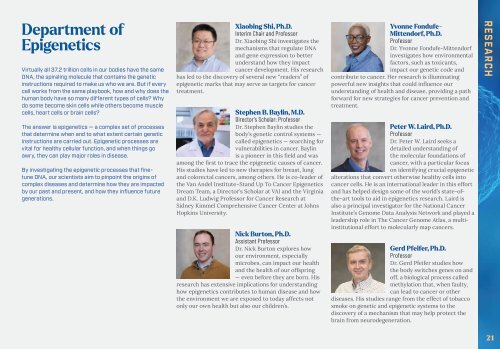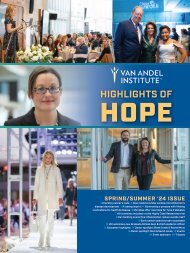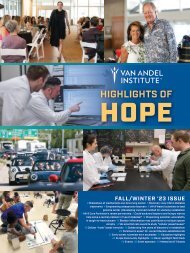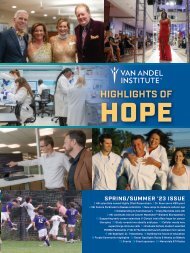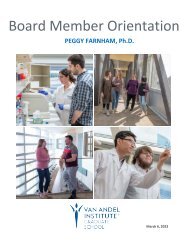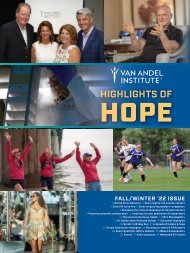2022 Annual Report
This is the 2022 Annual Report for Van Andel Institute.
This is the 2022 Annual Report for Van Andel Institute.
Create successful ePaper yourself
Turn your PDF publications into a flip-book with our unique Google optimized e-Paper software.
Department of<br />
Epigenetics<br />
Virtually all 37.2 trillion cells in our bodies have the same<br />
DNA, the spiraling molecule that contains the genetic<br />
instructions required to make us who we are. But if every<br />
cell works from the same playbook, how and why does the<br />
human body have so many different types of cells? Why<br />
do some become skin cells while others become muscle<br />
cells, heart cells or brain cells?<br />
The answer is epigenetics — a complex set of processes<br />
that determine when and to what extent certain genetic<br />
instructions are carried out. Epigenetic processes are<br />
vital for healthy cellular function, and when things go<br />
awry, they can play major roles in disease.<br />
By investigating the epigenetic processes that finetune<br />
DNA, our scientists aim to pinpoint the origins of<br />
complex diseases and determine how they are impacted<br />
by our past and present, and how they influence future<br />
generations.<br />
Xiaobing Shi, Ph.D.<br />
Interim Chair and Professor<br />
Dr. Xiaobing Shi investigates the<br />
mechanisms that regulate DNA<br />
and gene expression to better<br />
understand how they impact<br />
cancer development. His research<br />
has led to the discovery of several new “readers” of<br />
epigenetic marks that may serve as targets for cancer<br />
treatment.<br />
Stephen B. Baylin, M.D.<br />
Director’s Scholar; Professor<br />
Dr. Stephen Baylin studies the<br />
body’s genetic control systems —<br />
called epigenetics — searching for<br />
vulnerabilities in cancer. Baylin<br />
is a pioneer in this field and was<br />
among the first to trace the epigenetic causes of cancer.<br />
His studies have led to new therapies for breast, lung<br />
and colorectal cancers, among others. He is co-leader of<br />
the Van Andel Institute–Stand Up To Cancer Epigenetics<br />
Dream Team, a Director’s Scholar at VAI and the Virginia<br />
and D.K. Ludwig Professor for Cancer Research at<br />
Sidney Kimmel Comprehensive Cancer Center at Johns<br />
Hopkins University.<br />
Nick Burton, Ph.D.<br />
Assistant Professor<br />
Dr. Nick Burton explores how<br />
our environment, especially<br />
microbes, can impact our health<br />
and the health of our offspring<br />
— even before they are born. His<br />
research has extensive implications for understanding<br />
how epigenetics contributes to human disease and how<br />
the environment we are exposed to today affects not<br />
only our own health but also our children’s.<br />
Yvonne Fondufe-<br />
Mittendorf, Ph.D.<br />
Professor<br />
Dr. Yvonne Fondufe-Mittendorf<br />
investigates how environmental<br />
factors, such as toxicants,<br />
impact our genetic code and<br />
contribute to cancer. Her research is illuminating<br />
powerful new insights that could influence our<br />
understanding of health and disease, providing a path<br />
forward for new strategies for cancer prevention and<br />
treatment.<br />
Peter W. Laird, Ph.D.<br />
Professor<br />
Dr. Peter W. Laird seeks a<br />
detailed understanding of<br />
the molecular foundations of<br />
cancer, with a particular focus<br />
on identifying crucial epigenetic<br />
alterations that convert otherwise healthy cells into<br />
cancer cells. He is an international leader in this effort<br />
and has helped design some of the world’s state-ofthe-art<br />
tools to aid in epigenetics research. Laird is<br />
also a principal investigator for the National Cancer<br />
Institute’s Genome Data Analysis Network and played a<br />
leadership role in The Cancer Genome Atlas, a multiinstitutional<br />
effort to molecularly map cancers.<br />
Gerd Pfeifer, Ph.D.<br />
Professor<br />
Dr. Gerd Pfeifer studies how<br />
the body switches genes on and<br />
off, a biological process called<br />
methylation that, when faulty,<br />
can lead to cancer or other<br />
diseases. His studies range from the effect of tobacco<br />
smoke on genetic and epigenetic systems to the<br />
discovery of a mechanism that may help protect the<br />
brain from neurodegeneration.<br />
RESEARCH<br />
1721


